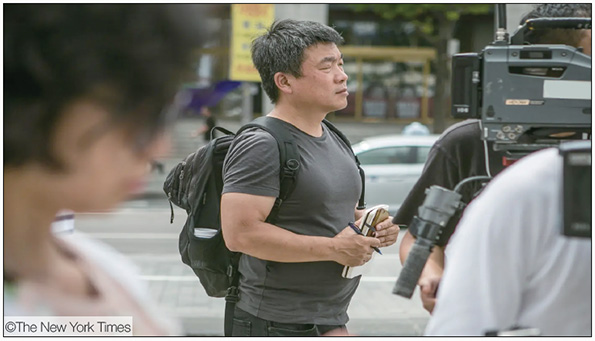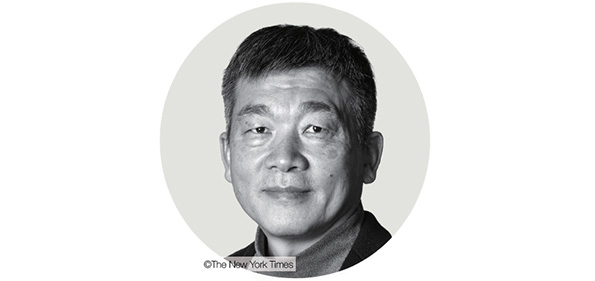
When thinking about an English newspaper or international press, what can people usually think ofcc? They may think various presses from CBT which is the one currently reading, The Korea Herald from domestic, Associated Press (AP) and The New York Times (NYT) from U.S. to Reuters and BBC in U.K. These big media often have foreign branches to cover international news. By this chance, CBT reporter had interview with Choe Sang-hun Seoul bureau chief of NYT. The reporter could hear about the thoughts of what he thinks about the job, journalist and specialty and characteristics of digital and English newspaper.
Q1. Please introduce yourself to the readers.
I am Choe Sang-hun, currently working for NYT as Seoul bureau chief. I started working as a reporter for The Korea Herald in 1991, and moved to AP in 1994. I started working here for the NYT in 2005.
Q2. CBT reporter heard that you did not intend to be a journalist at first. Is there any certain job that you wanted to do?
The short answer is no. I did have a concern though, like ‘what should I do in the future?’ During that period, one of my friends was going to go for a press entrance exam, and I followed him. I was not a person who had a big dream, passion and duty to be a journalist from my childhood. Yet, most people might not want this job from their childhood, they sometimes simply happen to have a journalism job and think they should continue on the path after experiencing it for a while. This was my experience in a nutshell. I started to work as journalist and I thought I could do this and felt excited. However looking back, I think I had a bit of an interest in writing articles.
Q3. Then, is there any specific reason for deciding to be a journalist?
First, the job of journalists is to apprehend issues in each field they are covering, like an argument that is currently a hot potato, or a relatively small problem that needs to be in the spotlight and informed to the public. Then, the journalist questions from his or her own perspective and writes a report to the public telling them that “I saw and analyzed this issue from my perspective, and these are my conclusions.” I think this is what journalists do, distributing their own storytelling report about an issue to many people. This is the point ot this job attractive that I think. For example, when a Korean correspondent like me reports about Korea, foreigners can realize what is currently on issue in Korea and may look back on themselves or understand the thoughts and agonies of Koreans. I think it is a meaningful activity to bring out these thoughts and garner empathy from various people. I started this job with no sense of duty at first, but, from what I have experienced so far, I feel very excited, rewarded and worthy from these processes.

Q4. What is your most memorable article throughout 30 years of journalism life?
Since I am an older journalist, I do often get those kinds of questions. However, I do not have an especially memorable article. Many people remember me as a Korean journalist who received The Pulitzer Prize, but I do not tell someone that the one most famous article is the most memorable article. I love all my articles that I write at the time of writing, regardless of its importance. In my opinion, I think all journalists themselves must have the attitude to enjoy and concentrate on each article they are writing. Surely, as a journalist at a company, there are bound to be articles that needs to be written, so they may not be able to write the article that they want to write. Therefore, I try to find excitement from ones I write every day. When I look back after a while, there are many articles that felt exciting in its own way. Thus, I usually remember my articles when I see something related, like “Ah, I did write an article about this thing. Something similar happened back in that day.”

Q5. CBT reporters think the focus of your articles is different from local media because you work at the Korean branch of foreign press. Judging by this, what do you pay attention to most when you write an article?
I think who the reader of my article will be, is the most important thing. For example, when I write an article about any event at CBNU, the directionality is different depending on whether I write to CBNU students or outsiders. Moreover, suppose we introduce the event to foreigners, the beginning should include an explanation about what kind of institution CBNU is. I always bear this in mind when I select a topic and compose the contents.
Mostly, newspaper staff determine who the readers of the publication will be. Then they write an article focusing on them. My assignment is to write an article about the Korean Peninsula including South and North Korea, to readers as Seoul branch chief for NYT. In this case, readers of NYT are mostly American as it is American press. However, they think the people who consume the news in English all over the world are all potential readers. Therefore, I must consider ‘what is an interesting and amusing topic for an article about Korea from the perspective of this international reader?’ Once we establish the topic, the news report is premised on this.
We write a story about human interest that people are actually interested in. Sometimes, a topic may not seem very meaningful, but if we cover and report it from a unique perspective, it can attract the interest of foreign readers. However, we should not distort the meaning of the topic or the facts. Therefore, the way we see and understand the phenomenon is important.
Q6. These days, the trend is for traditional newspapers to evolve into digital news. At this moment, what do you pay attention to most when you write an article depending on the medium?
Preferentially, the traditional newspaper’s circulation is fixed, and the people who will receive it are the definitely readers. On the other hand, the online newspaper is open because all people around the world who have access to the internet are potential readers. As a journalist, I have to consider many factors when writing an article, such as its content, tone, and direction. These can vary depending on the target audience and the purpose of the article. Moreover, for a daily newspaper, the time to publish an article is crucial. If I write about a common topic, there are dozens or hundreds of other journalists writing about it, so I have to be fast and accurate even though I modify my article few hours later. Therefore, I question myself to choose a suitable angle and approach for each topic because I have to compete for the attention of the readers and make them want to read my article.
Q7. What are specific differences between the domestic English newspaper and Korean topic articles from foreign presses?
I think we should just compare traditional newspaper because of the evolution of internet and online news services and seems like similar question with the previous one about the public. In fact, newspaper such as the Korea Herald were published and sent to overseas diplomatic missions in the past. As foreigners residencing in Korea and domestic readers of English newspaper practically are living in Korea, they know more about Korea and are interested in various issues than foreigners living in overseas. Furthermore, the articles from domestic English press are fundamentally related to Korea. On the other hand, compared to foreign presses which only sends a small number of correspondents to Korea, the content and direction of articles reported by foreign presses are bound to be much narrower than domestic presses.
Q8. Please share your belief or motto, if you have one, that guided you throughout your career as a journalist.
I do not have a profound belief or motto, but I always try to do my best in whatever task I have to do. I also respect and appreciate all people equally, regardless of their status. I think it is important to work hard and follow professional ethics. I do not care about whether the job is good or bad, the rating is high or low, or the way to success or not. What matters to me is to become an expert in my field and be recognized for my skills and knowledge.
By Ji Jae-lim | jlim0714@chungbuk.ac.kr
By Yu So-won | 16slysw@chungbuk.ac.kr


 All
All People
People






 Ji Jae-lim&Yu So-won
Ji Jae-lim&Yu So-won











